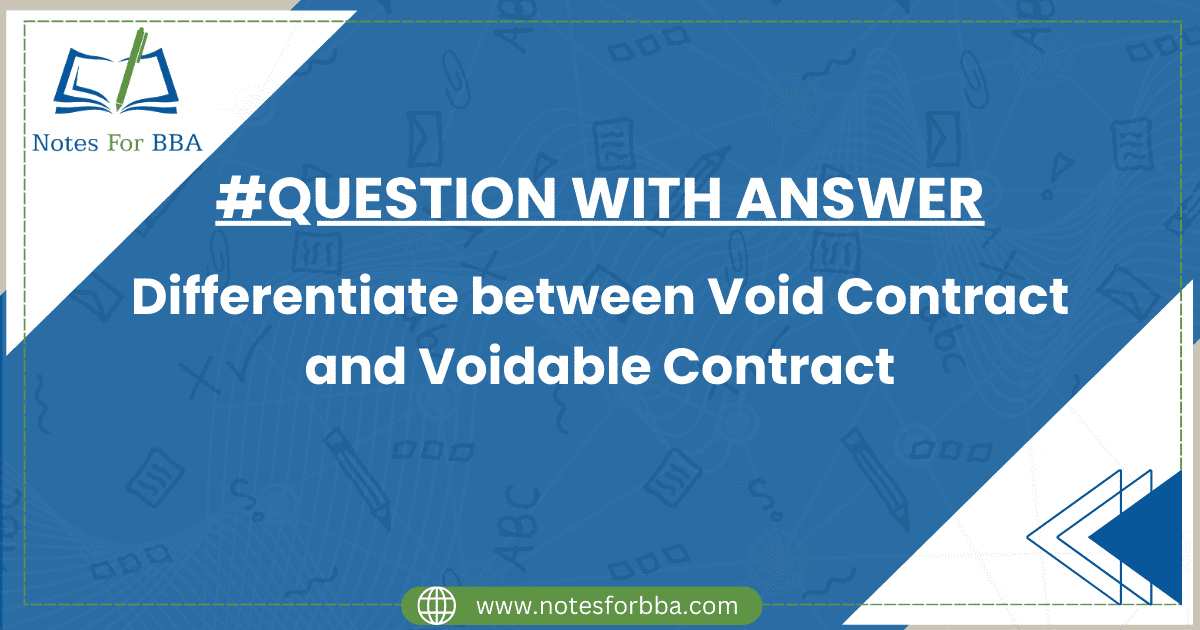A Void contract refers to an agreement that is inherently invalid from its inception. It fails to include one or more critical components, such as a lawful objective, consideration, or mutual agreement. Consequently, it is regarded as if it never occurred and cannot be upheld by either party involved.
Conversely, a voidable contract is one that is valid and enforceable at the outset but may be annulled by one party due to specific concerns, including fraud, coercion, or misrepresentation. The party impacted by these concerns retains the right to either uphold or terminate the contract.
The difference between void contracts and voidable contracts pertains to their validity, enforceability, and the rights of the parties involved. Below is a comprehensive comparison.
| Aspect | Void Contract | Voidable Contract |
|---|---|---|
| 1. Definition | A contract that is invalid and unenforceable from the beginning (ab initio). | A contract that is valid and enforceable until one party chooses to void it. |
| 2. Legal Status | It is not recognized as a valid contract by law. | It is a valid contract unless and until it is rescinded by the aggrieved party. |
| 3. Enforceability | Cannot be enforced by either party. | Enforceable by the aggrieved party unless voided. |
| 4. Cause of Invalidity | Arises due to unlawful object, lack of essential elements (e.g., consideration, consent), or prohibited agreements. | Arises due to defects in free consent (e.g., coercion, fraud, misrepresentation, undue influence). |
| 5. Effect on Parties | No legal obligations or rights arise for the parties. | Obligations and rights exist until the contract is voided. |
| 6. Right to Rescind | Neither party can rescind the contract because it is void from the start. | The aggrieved party has the right to rescind the contract. |
| 7. Examples | 1. A contract to commit an illegal act (e.g., smuggling). 2. A contract entered without consideration. | 1. A contract signed under coercion. 2. A contract entered into due to fraud. |
| 8. Effect of Voidance | No legal impact, as the contract never existed. | Once rescinded, the contract becomes void and ceases to bind the parties. |
| 9. Effect on Third Parties | Does not affect third parties’ rights, as it is considered nonexistent. | Can affect third parties if they were unaware of the defect, but they might be protected if acting in good faith. |
| 10. Time of Defect Discovery | The defect or illegality is evident from the start, making the contract void immediately. | The defect (e.g., coercion or fraud) is discovered after the contract is formed, and the contract remains valid until rescinded. |
The primary distinction between a void contract and a voidable contract pertains to their validity and enforceability. A void contract is fundamentally invalid from its inception and possesses no legal effect, rendering it unenforceable by either party. Conversely, a voidable contract is valid and enforceable at the outset, but one party retains the option to annul it if a defect exists in the agreement, such as fraud or coercion. While void contracts are regarded as non-existent, voidable contracts maintain their validity unless the affected party opts to rescind them. Grasping these differences is essential for recognizing the legal implications and available remedies in each scenario.
All questions with answer of Chapter Nepalese Contract Law– Click here

